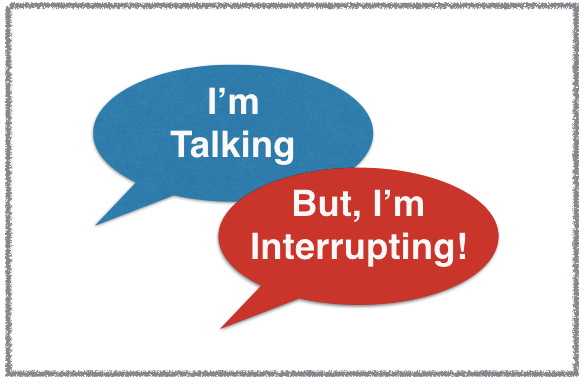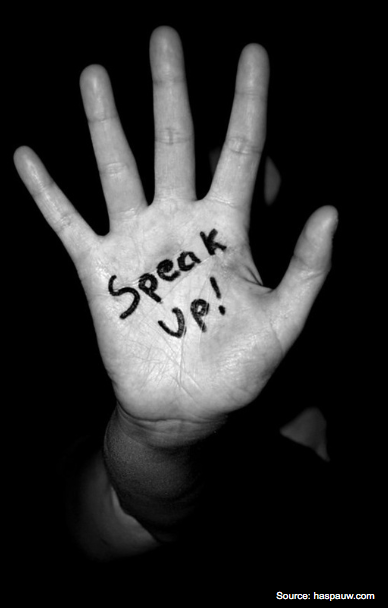Board Meetings With Continual Public Interruptions
Interrupting meetings has become an all too common occurrence. Small thing? Maybe not. Interruptions can make meetings that much more painful. They silence certain voices you want and need in the conversation. Ultimately it chips away at a positive culture. What's happening and why?
People talking over or cutting others off and interrupting your meetings is an annoyance, right?
It's challenging to make meetings a reliable use of time, on a good day. Interruptions make it that much harder. It is more than an annoyance though. It also chips away at the culture. Loud voices can get more time while others get diminished or silenced. It takes its toll on your people and your business in ways you can't afford. It's a bit insidious actually because the interruptions lead to silence.
"There's zero correlation between being the best talker and having the best ideas." ~Susan Cain
One of the most significant challenges to progress is that you are dealing with primarily a silent enemy. Yes, interruptions happen, but I doubt anyone is going to jump up and down. Instead, meetings conclude without all ideas getting on the table. And your people (who got interrupted) leave frustrated and when it happens repeatedly, demoralized. Again, a silent enemy.
Why are we at this place and what can you do about it?
Excuse me, Bam!
Imagine you are walking down a sidewalk to your office. Someone says excuse me and plows into you knocking you to the ground. They smile and leave. You get up and get on to the office a little banged up and annoyed as hell.
Off you go to your first meeting. You are mid-explanation on something. One of your colleagues says excuse me and proceeds to interrupt – a full-on hijack of the conversation. Again you pick yourself up, albeit a little banged up and equally annoyed (as hell.)
The first scenario would get you in some trouble. The equivalent during a business meeting is all too common and yet accepted. Time to throw a penalty flag!

The Last Meeting You Attended
Think back to your last meeting. I'm guessing there were many people interrupted. Maybe you were one of them?
Inc Magazine recently published data in an article called Ineffective Meetings Cost Companies Up To $283 Billion A Year. They revealed that for the average business conference call in the US (which is 38 minutes), there were 13 minutes of interruptions or distractions. Almost 35% of the call!
Why Do People Talk Over Top Each Other?
Individuals interrupt one and other in meetings with regularity. As for reasons why there is a host of them. In her self-proclaimed rant (love that), Anneli Blundell on LinkedIn laid out 7 reasons people talk over the top of others.
- It's what they learned in childhood
- It's a cultural thing (family, relationships, geography)
- It's a narcissistic thing
- It's an insecurity thing
- It's an excitement thing
- It's a power play
- It's a lack of awareness
There are varying levels of self-awareness (in general) and indeed when it comes to interrupting. As with many things, most people don't see themselves as "the problem." Why should they? There are rarely consequences.
Also, it's modeled all the time in the media. I could name a few shows I watch on networks ranging from MSNBC to Bravo, where there is a steady diet of it. Probably too much information.
The combination of people's wiring and motivation, acceptance in our business culture and short attention spans, get us to this place.
Not All Interruptions (or People) Are Treated The Same
The research (Harvard Business Review's article How to Handle Interrupting Colleagues) on the topic of interruptions references cooperative and intrusive interruptions.
Cooperative interruptions include the quick request for clarification or interjections in a spitballing or brainstorming session.
I'm focusing here on intrusive interruptions, meaning redirecting a conversation, stating disagreement, starting a debate and of course, "I wildly agree and want to tell you why." All midstream to the person speaking.
The issue goes beyond a few unproductive meetings. Women get interrupted more than men. Introverts get left on the sideline when the loudest voices assume control.
Let's dig into each.
Men Who Interrupt Women
Multiple studies over the last few decades have shown, women are interrupted disproportionately more than men.
Various studies detailed in both The New York Times and Forbes, headline the following:
- Men interrupt more than women. When men interrupt, it is with women far more than men
- Women interrupt less than men. When women do it, it is more likely to interrupting other women.
- The more senior a person, the more likely they are to interrupt.
As a result, several words have emerged in modern culture including manterrupting.
Manterrupting is an Internet slang term used to describe an unwarranted interruption of a woman by a male colleague in workplace environment.
Hard to think anything other than we shouldn't need in our lexicon!
My point in covering this isn't about pitting women against men. Instead, it's about awareness to serve as a guide forward for all of us.
Introverts and Extroverts
You have all kinds in a given meeting. That's good. Start with the premise that you want all voices at your table. Consider how group settings draw out (or not) the folks on your team.
Interruptions are more likely to impact an introvert. Speaking as one I can say, they are already inside their head analyzing what and when to say whatever. You set a tone on whether all voices or just the loudest have a place.
Here too, this is not about making excuses for or patronizing people. It's about creating an environment that optimizes everyone's contributions.

(Related: Understanding current workplace dynamics is critical. It requires an open mind and a willingness to adapt. Take a read of Why The Best Leaders Empty Their Cup First for more.
No; These Are NOT The Answers
Telling those being interrupted to be different. It is incredible how many articles on this topic detail how people can prevent themselves from being interrupted. The suggestions include talking louder, faster, don't look at people, ask if you can finish, blah blah.
While I'm sure some of these have a short-term impact, they border on self-help advice. By all means, people should be articulate and thoughtful in their participation. But coming at the issue in reverse doesn't make sense. People interrupting your meetings do their thing, while others have to play a game of sorts to get heard. My advice, don't lean on this as the solution.
Like some of you perhaps, early in my career I was told to speak up more in meetings. So, I did. I got interrupted frequently. What the heck I thought. It was confusing at best. I handled it, but it wasn't ideal particularly against the backdrop of the ask.
You don't want your people SILENTLY saying "screw it; I'll just sit here, till it's over. I don't feel like being interrupted by Jeff, again."
Creating too much rigor or a stifling environment. On the other hand, trying to stop people from interrupting your meetings does not mean you want people to raise their hand to speak. Your team sitting in silence, not talking about the real issues won't work.
Managing the balance is nuanced.

How To Deal With Those Interrupting Your Meetings
Exercise balanced, straight talk in the room. A simple, real-time course correction is appropriate. For example saying, "hang on, let Pat finish his/her comments" will have an impact. You set a tone and an expectation by dealing with any issues at the moment.
Assume positive intent. Most people don't get up in the morning thinking about controlling all the conversations they will be in during the day. A real-time course correct strikes the right tone. If it doesn't work you can deal one on one with the serial interrupter, the terminally long-winded, bullies and any others on your team who are detracting from an open, inclusive dialogue. I can assure you everyone knows who the painful people are. They are the ones who get talked about on instant manager during conference calls.
Senior people need to lead by listening. Senior people doing more of the interrupting isn't surprising, but it's a terrible reminder. It's about running productive meetings and leadership style. Short form – don't "lead the way" in interrupting. Also, deal with other senior colleagues you invite (as best you can).
Focus On Culture
I'm sure you have painful, complicated issues in your business. This shouldn't be one of them. More important, it's one you can tangibly and positively impact.
Telling someone to be more of one thing and less of another so they won't get interrupted, won't create the culture you want. Instead, you can set the tone for what a professionally collaborative environment means day to day. Your team will follow your lead.
Your people – all of them – and your business will be better for it!
QUESTION:
How do you manage people interrupting your meetings?
Please know that sharing your comments below & across this audience matters. A robust conversation to benefit all can and will break out! Thank you in advance for sharing and engaging.
Tools You Can Use
For a printable PDF of this post, click here.
Resources to Dig Deeper
New York Times piece by Sheryl Sandberg and Adam Grant – Speaking While Female
Forbes ArticleGal Interrupted, Why Men Interrupt Women and How To Avert This In The Workplace
Art Petty blog post on How To Defeat A Meeting Room Confrontation, click below
How to Win When You're Under Attack in a Meeting at Work https://t.co/WAqlLjed2R
— Art Petty (@artpetty) February 26, 2018
Source: https://leadingpeopleright.com/leading-every-day/who-keeps-interrupting-your-meetings-make-it-stop/

0 Response to "Board Meetings With Continual Public Interruptions"
Post a Comment